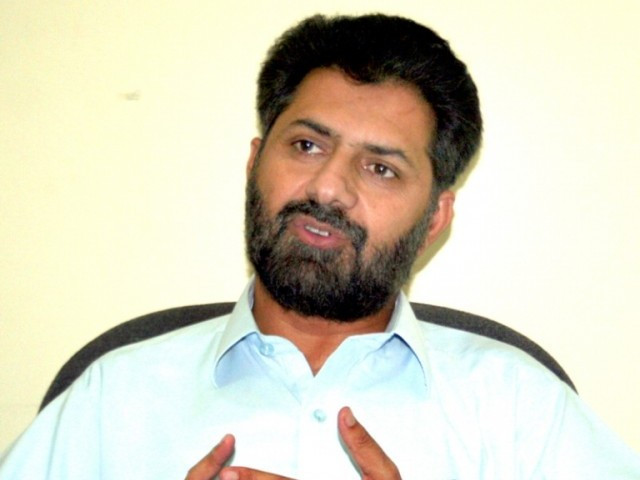A little patience: Multiple cluster survey in 2016 to help with future LG allocations
Senior minister acknowledges ‘K-P LG system needs time to settle’

Minister for Local Government Inayatullah Khan. PHOTO IQBAL HAIDER
With the last census conducted in 1998, how can the Khyber-Pakhtunkhwa government set up a local government system without knowing local population strength and the accompanying need for infrastructure? Speaking to The Express Tribune, the man behind the system Minister for Local Government Inayatullah Khan has shared the provincial government is conducting a multiple cluster survey that will be completed by June 2016. This survey will form the basis of allocation of funds for the local government system under the Provincial Finance Commission (PFC). A census is also expected in the same year.
Ever since the LG system has been reintroduced in K-P, it has been under scrutiny by politicians, the masses and the representatives themselves. Some complain of inadequate devolution of powers while others complain of funding problems. Inayatullah himself looks at the new system with both a glass half empty and a glass half full point of view.
A long time coming: Govt, PTI leaders okay rules of business for LG
Whose money is it anyway?
When talking of the fund allocation for the local government, he says of the total Rs144 billion, Rs102 billion is either for the salaried or non-salaried component. The manner in which the remaining Rs42 billion is spent will be decided by the PFC.
The PFC’s allocation is further broken down as 50% on the basis of population, 25% based on poverty, 20% for the lack of infrastructure and 5% on revenue.
One the other hand, 30% of the total funds distributed to the local bodies under the PFC are solely allocated for development by the district, tehsil or village councils. The District Development and Advisory Committee (DDAC) has nothing to do with them. At the same time, Inayatullah says, district and tehsil nazims are coopted members of the DDAC so there is no overlapping in development schemes.
However, these allocations to districts are on the basis of the census conducted in 1998, while poverty and lack of infrastructure are measured by an almost seven-year-old survey. As a result, questions arise on whether current distribution is based on ground realities? The multiple cluster survey, Inayatullah said, will be the solution to this dilemma.
Regardless, the increase in current allocations has been phenomenal. There are areas like Lower Chitral which was given Rs7million in the past but that figure has been increased to Rs110 million.
Nazims elected for Provincial Finance Commission
Ironing out the system
In Inayatullah’s explanation, systems take time to get established, adding the main reason for existing hurdles is the transitory phase. “Local bodies ceased to exist because of the transition from democracy to autocracy.” However, he does not deny the involvement of political forces which have been reluctant to establish local governments because of their desire for powers to be concentrated “Let’s give them time because there is no prerequisite,” he suggests.
The minister says he is well aware of the several lacunae which range from differences between political alliances in districts to complaints of non-transfer of funds.
Talking about the advantages, he cites the example of the recent earthquake. He points out that village councils formed committees and conducted surveys under the government’s instructions and these were further verified by the military in the final phase. “However, the presence of a body at the grass-roots level not only monitors, but also actively participates—and immediately—and this makes all the difference,” he believes.
Power of the nazim
Inayatullah rejects the notion that the amended K-P Local Government Act 2015 has reduced the authority of the nazims or their respective councils through legislation tilted in favour of MPAs. “[This belief] is all because of the lack of understanding,” he says.
However, local government representatives have taken to the streets in protest against the powers given to the bureaucracy. They say these are in violation to the Constitution and the spirit of the 18th Amendment which empowers local bodies. When the law was first passed, experts hinted that such an argument would arise.
The senior minister acknowledges that a power tussle exists and “it will take time to settle down”. He stressed that “guidelines” given to local government representatives are based on past experiences and exist to ensure that the budget is mostly spent on local development schemes like pathways and streets. After the devolution of districts in the aftermath of the 18th Amendment, local governments will have to manage their expenses and therefore guidelines are important.
Published in The Express Tribune, December 6th, 2015.













COMMENTS
Comments are moderated and generally will be posted if they are on-topic and not abusive.
For more information, please see our Comments FAQ